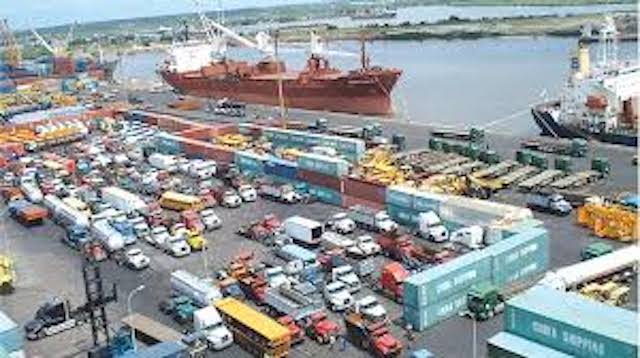Business
Operators report sluggish import activity across ports

As the Christmas season approaches, licensed agents in Nigeria’s maritime sector have reported a sharp decline in importation, ranging from 40 to over 50 per cent. Some industry players estimated drops of up to 80 per cent, while others put the decline at 63 to 70 per cent.
In separate telephone interviews with our correspondent on Sunday, former interim National President of the Association of Nigerian Licensed Customs Agents, Mr Pius Ujubuonu, explained that multiple factors have contributed to the slowdown in importation.
“No doubt, there is a reasonable drop in cargo throughput. And the reason for that is not unconnected with a lot of factors, number one being foreign exchange. As of August, the drop in importation was about 62 to 65 per cent. Let’s assume that by these additional two or three months, it has dropped more to about 70 per cent. So let’s say it’s between 65 to 70 per cent,” Ujubuonu said.
Responding to questions about the relative stability of the exchange rate, he added, “Importation is not just a one-off thing. If you want to import in the next month or two, you should start planning now. So whatever position you are seeing now was influenced by decisions made in the last three or four months. Another problem is the lack of planning.”
He also cited government policy inconsistencies as a major factor affecting cargo importation. “The government’s regular policy somersaults are part of the problem. Before, people blamed infrastructural deficits, but the major issues now are fiscal and trade policies,” Ujubuonu said.
He warned that importation could decline even further. “The percentage is going to drop more,” he noted.
Former Secretary-General of the National Association of Government Approved Freight Forwarders, Emeka Okonkwo, agreed that importation has dropped, but suggested the decline is not as severe as some claim.
“Importation has dropped, but not up to 80 per cent. The decline should be around 40 to 50 per cent. Normally, importation increases during Christmas, but this year, there are challenges. Many importers cannot operate because there’s limited liquidity. People are not buying as much, so goods remain unsold in warehouses, which affects further imports,” Okonkwo said.
Earlier, Mr Ugochukwu Nnadi, a member of the Elders of Maritime Agents and Associations, also confirmed a significant slowdown. “Importations are very dull. Most shipping companies have only one or two ships berthing until the end of the year.
“Years ago, ports were congested with ships lined up to discharge goods, but that is no longer the case. The cost of doing business is high, and uncertainties around government tax policies have made importers cautious. There is an over 80 per cent drop compared to previous years,” Nnadi explained.
Conversely, the National President of the Africa Association of Professional Freight Forwarders and Logistics of Nigeria, Mr Frank Ogunojemite, disputed the reports of a decline. “There is no drop in importation. From my perspective, importation has actually increased, given the rise in freight charges from China to Nigeria. If importation had declined, shipping charges would have fallen. My data shows the market is better this year than last year,” he said.
The slowdown in importation mirrors challenges across Nigeria’s automobile market. Data from the National Bureau of Statistics show that passenger car imports fell sharply, reflecting a decline in consumer purchasing power and transport sector activity.
According to NBS foreign trade data, passenger motor vehicle imports in the first six months of 2025 totalled N479.26bn, a 9.69 per cent decline from N530.67bn in the same period of 2024. The downward trend has persisted since 2023, when total imports fell from N1.47tn in 2023 to N1.26tn in 2024, a 14.29 per cent drop.
A quarterly breakdown shows imports in Q1 2025 at N224.58bn and Q2 2025 at N254.67bn, compared with N238.73bn and N291.93bn in the same quarters of 2024, underscoring the persistent slowdown.
Dealers and analysts cited foreign exchange constraints, high import duties, and reduced purchasing power as key reasons why car ownership is becoming increasingly unaffordable for both households and businesses. (Punch)
-

 News4 hours ago
News4 hours agoMajor, 3 Soldiers, Hunter Killed In Borno
-

 News4 hours ago
News4 hours agoUmrah Suffers Setback As Airlines Suspend Flights To S/Arabia
-

 Politics4 hours ago
Politics4 hours agoAtiku’s son resigns from Fintiri’s cabinet
-

 News19 hours ago
News19 hours agoJustice Tsoho To Appear Before CCB Over Alleged Non-Declaration Of Assets
-

 News4 hours ago
News4 hours agoRevised Executive Order: FG adjusts oil revenue remittance framework
-

 News4 hours ago
News4 hours agoPolice Council Confirms Disu As IG, To Be Sworn In Wednesday
-

 Politics3 hours ago
Politics3 hours agoDSS arrests social media user who ‘threatened’ Peter Obi after Edo attack
-

 Business4 hours ago
Business4 hours agoPrivate jet flight from Riyadh to Europe now cost N479m as elites flee Middle East tensions – Report


















